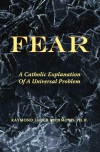Reverence for the Mass |
Spiritual Counsels |
Books |
About CSF
Love |
Joy |
Peace |
Patience |
Kindness |
Generosity |
Faithfulness |
Gentleness |
Self-control
 OU cannot buy your way into Heaven with politically
correct “good” works. Nor can you expect to be welcomed into Heaven by faith
alone. The path to Heaven is in the fruits of the Holy Spirit that result from an
ardent faith. OU cannot buy your way into Heaven with politically
correct “good” works. Nor can you expect to be welcomed into Heaven by faith
alone. The path to Heaven is in the fruits of the Holy Spirit that result from an
ardent faith.
Accordingly, many individuals who seek to
live a holy life, and who therefore want to make
prayer the central part of their lives, wonder how they can
tell if their experiences in prayer are truly inspiration from God or whether they are
mere psychological delusions. Similarly, they may want to evaluate their progress in
psychological treatment or spiritual direction.
Well, the best approach here
is to look to the “fruits” of the prayer—that is, the effects
which prayer, psychological treatment, or spiritual direction, produce in your
life—and ask if those effects are the fruits of the Holy Spirit.
So, what are the fruits of the
Holy Spirit? In Galatians 5:22–23 Saint Paul names them: love, joy,
peace, patience, kindness, generosity, faithfulness, gentleness, and
self-control.[1]
Let’s look, then, at
how each of these fruits might manifest in a soul that receives divine graces
through prayer.
LOVE
Christ Himself told us, “No
one has greater love than this, to lay down one’s life for one’s
friends” (John 15:13).
Now, you can lay down your life
in several ways.
You can lay down your life
literally by dying a physical death to protect someone from a physical
death. You can also lay down your life literally—as a martyr, for
example—in order to save someone from the scandal of a loss of
faith.
You can lay down your life
figuratively by sacrificing something
dear to you—money, time, or labor, for example—in order to help
others in the struggle for their own
salvation.
In all of these cases it can
be seen that true love is a matter of seeking the
good of another, even at your own expense.
 F YOUR PRAYER is truly effective,
therefore, it should be strengthening you to make the difficult sacrifices
of love. F YOUR PRAYER is truly effective,
therefore, it should be strengthening you to make the difficult sacrifices
of love.
Personal Meditation:
Today, most of us wouldn’t even lay down our TVs for Christ, let
alone our lives. So how often do you mistakenly believe that love is the
unconditional acceptance of anything? How often have you condoned sin in
this way, rather than make the sacrifices necessary to seek the true good
of others (i.e., their repentance of their sins)?
JOY
In the Letter of James we are
told, “Consider it all joy, my brothers, when you encounter various
trials, for you know that the testing of
your faith produces perseverance.” (James 1:2–3). Moreover, Saint
Francis of Assisi said that “if we accept such injustice, such cruelty
and such contempt with patience, without being ruffled and without
murmuring” and “if we bear all these injuries with patience and
joy, thinking of the sufferings of our Blessed Lord, which we would share
out of love for him . . . here . . . is perfect
joy”
(The
Little Flowers of St. Francis of Assisi).
Real spiritual joy, therefore,
refers to the ability to tolerate insult and injury from someone without
hating him, in the hope that he might
eventually repent his
sins and attain the everlasting joy of
Heaven, wherein there is no hate.
 F YOUR PRAYER is truly effective,
then, it should be strengthening you to tolerate joyfully the trials and
tribulations necessary to cleanse you of all that is not love. F YOUR PRAYER is truly effective,
then, it should be strengthening you to tolerate joyfully the trials and
tribulations necessary to cleanse you of all that is not love.
Personal Meditation:
How often do you mistakenly believe that joy is a matter of feeling good
about yourself and having everything go smoothly and pleasantly? How often
do you think only of “your way,” rather than thinking of God’s
way: not triumph and control over your enemies and the pain they cause you
but the willingness to endure suffering, as Christ did, in the hope of saving
your enemies from their own sins?
PEACE
At the birth of Christ, the angels
sang, “Glory to God in the highest and, on earth, peace to men of good
will” (Luke 2:14). Now, who are “men of good will”? Well,
the only good will is God’s will, so “men of good will” are
those persons, both male and female, who do God’s will, keeping
His commandments in reverent obedience and living
a holy lifestyle. They are a special sort
of people, the ones who pray to the Father, “Thy will be
done”—and really mean it in their hearts. Furthermore, because
they really mean it in their hearts, there isn’t anything they
fear and there isn’t anything they envy, and
so their hearts are at peace even in the midst of a corrupt
world.
 F YOUR PRAYER is truly effective,
then, it should be filling your heart with the peace of willing to
do God’s will at all times in all things. F YOUR PRAYER is truly effective,
then, it should be filling your heart with the peace of willing to
do God’s will at all times in all things.
Personal Meditation:
How often are you preoccupied with thoughts of “my” will, rather
than “Thy” will, thus getting caught in the mistaken belief that
peace can be achieved by forcing others to do your will through
politics and
protest?
PATIENCE
In the Second Letter of Peter
we are told that “the Lord does not delay His promise, as some regard
‘delay,’ but He is patient with you, not wishing that any should
perish but that all should come to repentance” (2 Peter 3:9). Patience,
therefore, has one purpose: holding off condemnation in the hope of
repentance that leads to
salvation.
 F YOUR PRAYER is truly effective,
then, it should be teaching you to endure
indifference, ingratitude, and contempt as
Christ did: not with hot-headed frustration but with a calm refusal to
hate. F YOUR PRAYER is truly effective,
then, it should be teaching you to endure
indifference, ingratitude, and contempt as
Christ did: not with hot-headed frustration but with a calm refusal to
hate.
Personal Meditation:
How often do you want to “get rid” of problems and
obstacles—be they things or people—rather than seek to understand
and remedy the underlying cause of the difficulties? When you are feeling
confused or helpless, how often do you become impatient with others, trying
to cast the blame on them and control them, rather than turn to God in prayer
for guidance and strength to face the unknown?
KINDNESS
In his letter to the Romans,
Saint Paul addresses many different issues, one of which is the basic human
tendency to be judgmental—that is, to want
the satisfaction of seeing others condemned for their sins. Paul reminds
the Christians in Rome that, because everyone will be judged by God, we all
should be grateful for the opportunity to
repent our sins
before it is too late. Thus he says, “Or do you hold His priceless kindness,
forbearance, and patience in low esteem, unaware that the kindness of God
would lead you to repentance?” (Romans 2:4).
Now, condemnation for the unrepentant
will come, but it will come from God alone. Still, God looks on us with
kindness—that is, with tender-hearted concern for us—according
to the possibility that every soul can be saved; therefore, we, too, should
treat others with kindness, not condemnation. “See, then, the kindness
and severity of God: severity toward those who fell, but God’s kindness
to you, provided you remain in His kindness; otherwise, you, too, will be
cut off” (Romans 11:22).
 F YOUR PRAYER is truly effective,
then, it should be leading you to repentance for your sins and to a
tender-hearted concern for others, that they might be led to their own
repentance. F YOUR PRAYER is truly effective,
then, it should be leading you to repentance for your sins and to a
tender-hearted concern for others, that they might be led to their own
repentance.
Personal Meditation:
How often do you deny the reality of sin by falling into the mistaken
belief that kindness means unconditional acceptance of anything?
GENEROSITY
Christ related the parable of
the Workers in the Vineyard to make a point about God’s generosity.
When the owner of the vineyard paid all the workers the same wage for the
day, regardless of when each man began work that day, some workers grumbled.
The owner rebuked them, “What if I wish to give this last one the same
as you? Am I not free to do as I wish with my own money? Are you envious
because I am generous?” (Matthew 20:14–16).
Generosity, therefore, has its
basis in the Creator’s freely sharing His creation with us, that all
repentant sinners might share fully in His love, regardless of whether repentance
occurs early in life or late in life.
 F YOUR PRAYER is truly effective,
then, it should be teaching you to experience divine love as absolute and
to rejoice in the divine love that others experience, regardless of their
spiritual progress. F YOUR PRAYER is truly effective,
then, it should be teaching you to experience divine love as absolute and
to rejoice in the divine love that others experience, regardless of their
spiritual progress.
Personal Meditation:
How often do you envy others for their spiritual progress or look down
on those who have made less progress in faith than you?
FAITHFULNESS
In his Letter to the Romans,
Saint Paul, speaking about how the Jews had been entrusted with messages
from the prophets, asks, “What if some were unfaithful? Will their
infidelity nullify the fidelity of God? Of course not! God must be true,
though every human being is a liar . . .” (Romans 3:3–4). In other
words, God remains true to His promises regardless of our
behavior.
Therefore, our faithfulness must
mirror God’s faithfulness; we must refuse to waver from the truth no
matter what happens to us.
 F YOUR PRAYER is truly effective,
then, you should be a true conservative, preserving and defending the divine
mysteries of the Church, regardless of the infidelity of others. F YOUR PRAYER is truly effective,
then, you should be a true conservative, preserving and defending the divine
mysteries of the Church, regardless of the infidelity of others.
Personal Meditation:
How often do you follow the crowd because you fear
being left out or rejected? How often do you betray your faith for the sake
of worldly reward? How often do you forget Christ’s words of warning:
“What profit is there for one to gain the whole world yet lose or forfeit
himself?” (Luke 9:25).
GENTLENESS
In his First Letter to the
Thessalonians, Saint Paul points out his behavior as a visiting evangelist:
“. . . we were gentle among you, as a nursing mother
cares for her children” (1 Thessalonians 2:7). In his First Letter to
Timothy, Paul says that a bishop’s behavior should be “not aggressive,
but gentle” (1 Timothy 3:3). Together, these verses tell us that gentleness
results from a sensitivity to fragility; like a good mother’s caring
protection, there should be no abrupt or forceful movements, no pushing,
no arguing, no manipulation.
 F YOUR PRAYER is truly effective,
then, you should be led into a nurturing attitude to others that always tries
to understand their fragility so as to guide their development at their own
pace. F YOUR PRAYER is truly effective,
then, you should be led into a nurturing attitude to others that always tries
to understand their fragility so as to guide their development at their own
pace.
Personal Meditation:
How often do you become frustrated when others don’t do what you
want them to do? How often do you try to manipulate others with shame—that
is, to attempt to make them feel that something is wrong with their
being, rather than with their behavior? How often do you become
argumentative when others don’t do what you
think they should do?
SELF-CONTROL
In his encyclical letter Spe
Salvi, Pope Benedict XVI refers to the fact that the ancient pagan world
lacked any hope of a meaningful future. He points to 1 Thessalonians 4:13
where Saint Paul makes reference to this fact in emphasizing the Christian
basis for hope.
Now, in a similar way, Paul’s
preaching also made use of another fact of the pagan world: its preoccupation
with self-indulgence. Thus we read in Acts that when Paul spoke to the Roman
governor Felix about faith in Christ Jesus, Paul focused on “righteousness
and self-restraint and the coming judgment” (Acts 24:25).
Of these three concepts, we might
expect to hear about righteousness and the coming judgment
because they are core concepts in the Gospels. But self-restraint—or
self-control— seems to be a Pauline reflection on the actual world around
him.
In 1 Corinthians 9:25, Paul plays
on this idea of self-restraint by remarking that, if athletes can
exercise discipline—or self-restraint—in order to achieve something
that is purely frivolous, Christians should be able to exercise discipline
to achieve something of the highest and most meaningful value.
 F YOUR PRAYER is truly effective,
therefore, you should be led into a desire to discipline and restrain your
own self-satisfaction for the sake of the highest
desire of all: to be filled with all the
fullness of God (Ephesians 3:19). F YOUR PRAYER is truly effective,
therefore, you should be led into a desire to discipline and restrain your
own self-satisfaction for the sake of the highest
desire of all: to be filled with all the
fullness of God (Ephesians 3:19).
Personal Meditation:
How often do you let your own personal desires take control of your life?
Are you overweight? Are you addicted to cigarettes or alcohol or drugs or
erotic pleasure or video games or . . .? You may have prayers on your lips,
but where is your true desire?

Notes.
1.
Church Tradition lists twelve fruits of the Holy Spirit: charity, joy, peace,
patience, kindness, goodness, generosity, gentleness, faithfulness,
modesty, self-control, and chastity
(Catechism of the Catholic Church,
1832).


Healing
|
Though
Demons
Gloat
|
Anger
&
Forgiveness
|
Falling
Families,
Fallen Children
|
Disasters
and
trauma
|
Psychology
from the
Heart
|
 |
 |
 |
 |
 |
 |
Psychological Healing
in the Catholic Mystic tradition |
True Christian
Identity
In Confronting
Evil |
How to Turn the
Emotional Wounds
of Daily Life Into
Psychological Growth. |
The Psychological
and
Spiritual Remedy
For Our Cultural
Disintegration |
The Struggle For
Psychological
and Spiritual
Growth |
Collected Texts
About the Spiritual Depth of
Clinical Psychology |
More information |
More information |
More information |
More information |
More information |
More information |
Desire
and
Distraction
|
Fear
|
Stopping
Smoking
|
Borderline
Personality
Disorder
|
Catholic
Compassion
|
Reverence
for the
Holy Eucharist
|
 |
 |
 |
 |
 |
 |
A Catholic Perspective
On Behavioral Change
and Its Subversion |
A Catholic Explanation
Of a Universal
Problem |
Through
Faith
and
Prayer |
Healing
the
Rage |
When They Tell You
That the Moral Teachings of the
Catholic Church
Are Wrong |
Reverent and
Proper Conduct in
a Catholic Church |
More information |
More information |
More information |
More information |
More information |
More information |
|





















